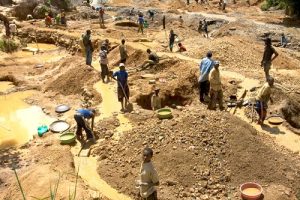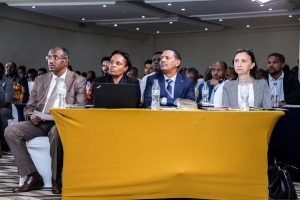BY GIRMACHEW GASHAW
Global climate negotiations have consistently been running for the past 25 years since Rio-92 and the 26th Cop (Conference of the Parties) is expected to be held this year. Over the past years, everybody was passionately deliberating on the issue.
Especially in 2009 in Copenhagen, it was expected that the parties would reach an agreement. But it failed because some countries, especially the anchor one’s-which are the major emitters like the USA didn’t take the lead. Still some of them were willing to reach an agreement.
Habtemariam Abate (Ph.D), a rural development and agricultural extension expert, has consistently participated in the COP sessions ranging from Cop15 to 2. He says the USA is the major greenhouse gas emitter contributing about 30 percent of the greenhouse gas globally. So, a deal without the USA cannot be considered meaningful.
“At that time, the president of the USA was Barack Hussein Obama. He is a positive person and tried his best to reach a deal. It failed to reach an agreement in Copenhagen as it was only the European Union which consists of 27 countries willing to come forward to implement the deal” he explained.
But the USA, Canada, Australia, and Japan which are considered as major western polluters did not come to the table with a positive spirit. According to Habtemariam, though there was a deal the problem was that it was not binding.
“That is what was lacking in 2009 but it managed to reach a deal again in 2020 in Paris which is not so binding as it appears to be. We say it is a binding deal if it is agreed by all and ratified by respective governments and parliaments of each country”
While it is in process, the current US president was elected. And the progress was held back. Again, we cannot say that the Paris agreement is also a binding one.
“So from my point of view, although we did not reach a binding climate agreement, the positive deal I would account for is climate consensus reached by nations. Although there is no binding deal, each country is taking responsibility this time.
They are introducing national laws, coming up with climate policies, taking some action like adopting renewable energy sources, and planting trees which reduces greenhouse gases from the atmosphere. All these positive activities would have constructive meaning, he noted.
There is a public awareness all over the world this time. Let alone the developed countries, developing countries like ours have been making tree plantations which received significant recognition. Ethiopia has been actively participating from the very beginning not only at the civil society level but also at the government level too.
The country is one of the active participants in the international climate change negotiation. We are contributing our share internationally but also locally. In short, the country is also aggressively taking measures at the local and community levels.
Currently, if you go to rural parts of Ethiopia, all our mountains are covered by physical terraces; and during the rainy season the whole rural population is out to plant trees due to the progress in awareness creation. Because by planting trees, constructing counter terraces, we can reverse the impact of climate change.
Especially Ethiopia as it has been affected by drought for several times, there is no better option than implementing environmental conservation measures. We have been active in environmental conservation over the past 30 years and it was very aggressive over the last 15 years.
Ethiopia has been planting trees in billions and the effort by itself is an indication of moves to reduce the negative impact of climate change. So, Ethiopia is an active player in the international climate negotiation and in mobilizing its society nationwide.
Concerning Ethiopia’s sole effort in positive impact worldwide, he replied “The international community is not successful in hitting ambitious climate change visions. We are showing the effort of the society not only in Ethiopia but everywhere in the world.
This is attributed to the international climate negotiation. Although they did not take the deal directly or indirectly, our nation is taking action. The awareness creation and community movement, I would say, are the lasting impact of our 30 years battle against climate change.
The climate change impact is becoming severe and severe. If we consider, for example, before one and half year, many countries in Africa were stricken by cyclonic wind. Thousands of people were displaced, billions of capital assets were lost due to climate change and even developed countries like the USA were affected several times by cyclones.
I was even there as part of the African Civil Society team, reporting to the US Congress and at that time I saw physically that most of the US states were devastated and I could not fly to Addis Ababa as 60 percent of the Chicago airport was rocked by cyclone.
People at the grass root level both in the developed and developing countries were severely affected due to climate change. As a result, agricultural practices are crumbling, sea levels are rising and glaciers are melting.
The entire northern coast this time, the accumulation of snow and ice is really breaking down due to climate change. Actually, there is very clear evidence that because of COVID-19, countries have suspended movement of vehicles and the operation of factories to a certain level and as a result the emission of the greenhouse gases is reduced.
Because of the reduction which is expected from emission and the movement of vehicles as well as factories, the average global temperature is reduced to some extent.
The hottest seasons during our history are the last 100 years, the annual temperature rose from negative 0.25 to about 1 degree Celsius. And the last 100 years are the hottest year; but it was not recognized.
There are escapists – who are claiming that the temperature rise was associated with global green gases. Thus, COVID-19 has revealed that because of the reduction of emission, the average temperature has reduced to some extent. This is noticed by many developed countries.
So the international climate change scientists led by a panel which we call the International Panel of Climate Change (IPCC), its report attributing global warming to greenhouse gas emission is really accepted more than ever this time; or the impact of climate change is aggressive if it is felt or really understood. So, climate change is happening at the grass root level.
Habtemariam suggests that continuous awareness raising tasks at public and sectoral level is highly needed. At the local level, our society, partners, and urban dwellers have to take action aggressively in protecting the environment: in planting trees, constructing counter terraces, and also use clean energy as well as stop fossil fuel.
We should at least reduce it and move towards green energy like for example as a source of fuel, energy, and hydro power is really recommended together with other green energy sources like geothermal and solar energy.
“We have to move towards this type of non-renewable energy source. We have to think about our policies; we have to aggressively change our lifestyle and shape our society in the same manner.
Apart from this, the role of civil society organizations should further strengthen their participation in protecting the environment so as to ensure sustainable climate resilient economic development,” the expert indicated.
The Ethiopian Herald February 19/2021





